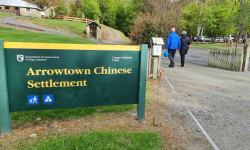
An ‘updraft’ in meteorology characterises a storm’s early development as warm air rises, eventually bringing the rains that offer sustenance and life. Rick’s hope for this monthly updraft column is for it to be a catalyst for change, ultimately contributing to the transformation of our faith communities. This regular column first appears in the Northern Baptist Association monthly newsletter, ‘Northern Lights’.
Over the past couple of years, we’ve talked a lot about our’ walking together’ or associating, aligning with one another, or covenanting together. In essence, it’s about how we are relationally journeying with one another as individuals who are part of a local church or as a collective of faith communities in an association. A large part of this focus stems from who we are as God’s people, as the Body of Christ. Scripture tells us we are all different parts of the same body (1 Corinthians 12). We are ‘being built together to become a dwelling in which God lives by his Spirit’ (Ephesians 2:22).
As we look more at the four Baptist distinctives and the seven doctrinal statements that comprise our New Zealand Baptist statement of faith, we see that to be ‘Baptist’ allows for a spaciousness of theological thought and practice. Each local church seeks to do life and faith through various rhythms and practices that help us be in relationship and discern the mind of Christ together. In the complex environment that we face today, how do we continue to ‘walk together’ as one body, while recognising the freedom and spaciousness our Baptist way of being church provides? It is far from easy, but we must do it for our God-given call as his people.
An approach to the journey which helps us on our way involves humility, as per Clark Pinnock’s quote below, and utilisation of a third space.
Nobody has all the answers – I certainly do not. But one way to make progress is to look at all the issues in a new way and enter into conversation.Theology does not depend on any single theologian. Truth will yield its secrets to the body of Christ if we will listen to God and to one another humbly, accepting correction. Clark Pinnock
Third space is a context for bringing people together beyond existing boundaries for the purpose of entering conversation. It may be ministry leaders within a church, people from different local churches, or people from different generations or ethnicities, for example. It’s a place where distinct groups (perhaps those viewed as the ‘other’) intentionally come together to connect, share stories, and grow in understanding and knowledge of one another.
Such spaces, by nature, are vulnerable places to be. As a result, they are often situations we try to avoid. We don’t like to be confronted with ideas that perhaps challenge our perspective, our theological or biblical understanding or the way we have imbibed a culture that doesn’t align with the ways of God. Yet, we need to realise that none of us has a whole perception of reality or a complete understanding of ourselves. We certainly can’t comprehend the mysteries of who God is and the workings of his Spirit in this world. To grow in unity and maturity (which we are called to as God’s people) requires a willingness to create these third spaces. It requires entering them in humility and with a willingness to listen and learn from the ‘other,’ in ways that continue to grow us and allow God to continue forming us in Christlikeness.
In a world of conflict, brokenness, and divisiveness, often fuelled today by keyboard warriors on social media, the church has an opportunity to be prophetic, showing a different way of life. How are we creating safe environments where people can share diverse perspectives and feel heard, accepted, valued, and loved, even by those with contrary viewpoints? What barriers do we need to overcome to create such spaces for healthy conversation and the discerning of Christ’s mind? How are we walking together, holding the pain of our differences, yet relationally connected and drawn together by the grace and love of God?
These are important questions for us to consider we seek the unity Jesus prayed for. He prayed that we might be one, just as he and the Father are one (John 17). Our willingness to create and enter conversation in third spaces is a pathway towards growing and expressing our unity. May we have the humility and courage to provide such spaces to continue to grow together in unity and maturity, discerning the mind of Christ as his body. In this declaring the love of God for and to the world.
Rick Pierce is Minita-a-rohe mō te Hauoratanga me te Whakawhanake, Network Pastor, Health and Development, Northern Baptist Association. You can contact Rick by email: [email protected]
For more editions of Updraft, click here.


